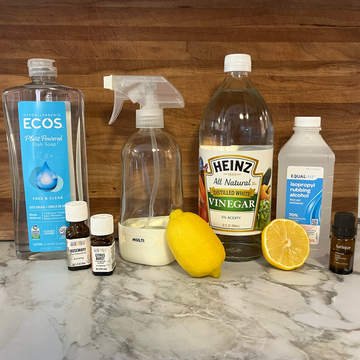There's almost nothing worse than spotting an ant in your kitchen only to then notice another, and another and another. Once one sugar ant finds sweets to snack on, they bring their friends. And before you know it, you officially have a sugar ant infestation.
While that may sound scary, there's no need to panic. There are plenty of ways to get rid of sugar ants fast using materials you probably already have at home. Whether you want to remove them naturally with vinegar or figure out the best way to seal entry points in your home, we have you covered. We spoke to an entomologist to learn more about these pesky creatures, their habits and how to eliminate them once and for all.
What Are Sugar Ants?
Sugar ants are omnivorous creatures that seek out sugary substances. It's important to note that the term doesn't refer to one specific ant species, but rather all sweet-seeking ants.
"Common examples are odorous house ants, pharaoh ants and carpenter ants. These ant species tend to be small and light brown or black and can quickly swarm around a food source, which makes kitchens, pantries, dining and other food storage areas prime targets for infestations," says Emma Grace Crumbley, entomologist at Mosquito Squad Plus.
How to Get Rid of Sugar Ants
In search for nourishment, sugar ants may make a beeline for the kitchen or pantry. If they find something to nibble on, they’ll help themselves to food for the colony, take it "to go" and spread the word about their goodies by leaving a pheromone trail.
In order to rid your home of sugar ants, you'll need to cut off their food source, disrupt their entryway and repel them with strong scents. Here are the most effective methods for getting rid of sugar ants:
1. Seal up access points.
If you're able to figure out how the ants are getting in, sealing up their access point should be a priority. If they're unable to enter the house, eliminating them will be a whole lot easier.
"To identify potential entry areas, check for plumbing penetrations or gaps in the foundation of your home and around doors and windows. It’s also best practice to routinely check anywhere you store food inside the home, including cabinets or pantries, which can make ideal feeding and hiding spots for sugar ants," says Crumbley.
2. Use dish soap and water.
Fill a spray bottle with 10 percent dish soap and 90 percent water. Spray it on the ants, and then wipe them up. While this will help you get rid of them temporarily, it's important to note that it's not the most effective long term solution on its own.
3. Clean the kitchen.
Sugar ants are attracted to fallen crumbs and sugary liquids, substances that are commonly found in the kitchen or pantry. That's why it's so important to clean the kitchen as often as possible, especially when dealing with a sugar ant infestation. "This includes properly sealing food containers, cleaning up immediately after meals and wiping down counters daily," says Crumbley.
4. Try white vinegar.
White vinegar acts as a natural ant repellent. It also may disrupt the pheromone trail, confusing ants and making it more difficult for them to find their way to your kitchen. To create an effective solution, combine equal parts white vinegar and water to a spray bottle. Spray the counters, floors, cabinets and anywhere else you've spotted sugar ants.
5. Spray essential oils.
Similar to white vinegar, essential oils like peppermint, thyme and citrus repel ants with their strong odors. To create your natural repellent, add around 10 drops of peppermint, thyme or citrus and a cup of water to a spray bottle. Spray all the surfaces that are attracting the sugar ants.
6. Buy ant bait.
Buy ant bait that contains food and a slow-acting toxin. Baits are often preferred over pesticides since you won't have residue on countertops and other surfaces. Plus, worker ants may bring the bait back to the colony and share it. If it gets to the queen, the colony will die out.
Our experts at the Good Housekeeping Institute recommend these products for getting rid of ants. However, you'll need to resist the urge to kill the ants on the spot so that the bait can work its magic. Expect to wait around 5-10 days before the ants are gone.
7. Hire a professional.
If you're struggling to tackle a sugar ant problem on your own, it might be time to call in a pest control professional who can better assess the issue and create a uniquely tailored plan based on your home's infestation.
How to Prevent Sugar Ants
Once you've had a sugar ant issue, you'll probably never want to deal with it again. These effective strategies will help fortify your territory.
- Landscape the perimeter of your home with rocks or pebbles, which will deter outdoor ants who don’t like to cross obstacles. Crumbley also suggests checking the mulch around the house, as ants are tiny enough to travel and build nests underneath. "If you choose to use mulch near your home, consider leaving a gap between the mulch coverage and the walls of the home. Alternatively, replacing wood mulch with rubber mulch or gravel can help minimize pest activity," she says.
- Seal exterior doors and windows, which can help with all kinds of pests. "Ensure doors and windows are sealed or have proper weather stripping and fix any foundational issues, including gaps or holes around plumbing penetrations and utility hook-ups surrounding the structure," says Crumbley. It's also important to inspect the bottom of your garage door, making sure there's no gap.
- Keep open food off the counter as much as possible. Keep the kitchen clean, taking out garbage, wiping down countertops and sweeping the floors as often as you can. You should also make sure to keep dog bowls and food away from doors, which may attract ants from outside.
- Drain standing water. "Ants are attracted to moisture, which means that one of the best defenses you can employ around your property is removing standing water. This includes fixing any leaky hoses or faucets, clogged drains, or areas with excess humidity within the home, as well as any pooling water around the yard," says Crumbley.
- Make another sweep of the kitchen before bed, cleaning up any sugary spills, whether it's juicy watermelon that dripped on the counter or a spot of honey that didn't make it into your tea.
Karen is a seasoned journalist who specializes in travel, book, lifestyle and food coverage. Cicero has visited almost every state with her family (look out Wyoming, she’s coming for you next!). She has spoken at several travel industry conferences, including PRSA and the Mid-Atlantic Tourism Alliance and was previously the senior editor at Parents. A mom who goes overboard for all the holidays, Cicero lives in the Christmas city itself: Bethlehem, Pennsylvania.
Laura Millar (she/her) is the assistant lifestyle editor for Good Housekeeping, where she covers home design. Prior to joining Good Housekeeping in 2024, she wrote for NBC's TODAY.com, where she covered everything from entertainment news to pop culture updates.



















